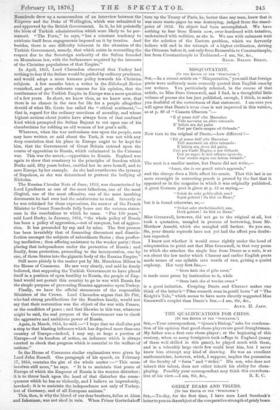MISQUOTATION.
[TO TIM EDITOR OF TER SPROTATOR.")
Si,—In a recent article on "Misquotation," you said that foreign poets were uniformly more correctly quoted than English ones by our writers. You particularly referred, in the course of that article, to Miss Dora Greenwell, and I find, in a thoughtful little
volume of poems she has just published, enough, I think, to make you doubtful of the correctness of that statement. I am sure you will agree that Dante's terza rime is not improved in this version, as at p. 89 of "Camera Obscure ":— "E al acme dell' site Macc.abeo Vide movers° un nitro roteando E' letizia era dal pale*
Coal per Carlo-magno ed Oritutdo."
Now turn to the original of Dante,—how different !—
Ed al nome dell' alto Maccabeo
Vidi mnoversi un altro roteando : E letizia era ferza del pale°.
Coal per Carlo Magno, e per Orlando Due no segui lo mio attento sguardo, Corn' occhio segue suo falcon volando."
The next is a smaller matter, but Dante did not write,- "Amor, che in cor gentil ratto's apprende,”
and the change does a little affect his music. That this last is no mere oversight in correcting proofs is proved by the fact that it appeared so in the magazine in which it was originally published..
A great German poet is given at p. 42 as saying,—
" Sehst du sehr gobliisslich ans ? Seyst getrost ! du bist zu Haus ;" but it is found otherwise, as,— " Siehst sehr sterbebiiisslich aus, Dock getrost I du bist zu Hans."
Miss Greenwell, however, did not go to the original at all, but took a quotation, mangled in process of borrowing, from Mr. Matthew Arnold, which she mangled still farther. So you see,
Sir, your drastic reproofs have not yet had the effect you doubt- less expected.
I know not whether it would come rightly under the head of misquotation to point out that Miss Greenwell, in that very poem to which she attaches the single line from Dante as a note, is at sea about the law under which Chaucer and earlier English poets made nouns of one syllable into words of two, getting a quaint euphony. Her very first line,—
" Store bath she of gifts meet,"
is made mere prose by inattention to it, while
"Store hath she of wordes sweet"
is a good imitation. Coupling Dante and Chaucer makes one think of the latter's " Pitee renneth sone in gentil herte " of " The Knight's Tale," which seems to have more directly suggested Miss Gree.nwell's couplet than Dante's line.—I am, Sir, &c.,
ALEX. IL JAPP..


































 Previous page
Previous page